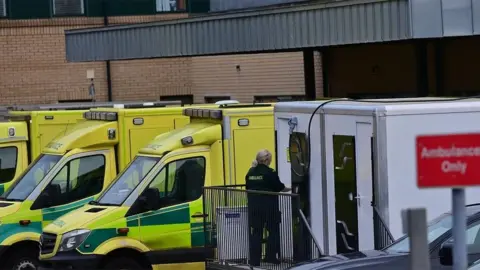Northern Ireland health service in need of intensive care
 Getty Images
Getty ImagesIt's a week where I have run out of adjectives to describe the crisis that's engulfing the health service in Northern Ireland.
Even the word crisis doesn't do justice to what's happening and while disaster seems excessive, calamity belittles the enormity of what's going on.
If I was allowed to sum it up in my own words - I'd say it's been a hellishly difficult week.
Headlines, while shocking, capture a system that's beyond broken.
The Royal College of Emergency Medicine warned that delays in emergency care could be causing the deaths of up to 500 people in the UK each week.
Locally, BBC News NI revealed an inquiry into eight deaths after ambulance delays.
An emergency department nurse told me his ward resembled a war zone where patients were treated amid scenes of chaos.
After I was given access to film inside the Royal Victoria Hospital in Belfast last month, I can verify his words are true.
Amid all the adjectives and numbers, often we forget we are talking about people.
 Pacemaker
PacemakerAt the time of writing, 403 men and women were waiting on a hospital bed - that number could fill a small hospital.
Of those, 378 were waiting more than 12 hours.
Space is limited and staff are trying their best but are exhausted.
There are many unsettling aspects about this week including that this no longer feels like a temporary glitch.
Instead, the daily reports of trolleys lying head-to-toe, side-by-side is becoming the norm.
If that continues the shock factor will wear off and overcrowded emergency departments could become acceptable.
Those on the front line are also becoming increasingly and openly frustrated with those behind the scenes who are attempting to fix the problem.
This week, the Royal College of Emergency Doctors said mitigating measures were "not working".
Another called on commissioners to take four hours to "road test" their solutions before introducing them to the "front-facing team on the shop floor".
A charity also said decision makers should sit down with those involved in domiciliary care to come up with solutions to tackle the ongoing problems in community care.
Being outspoken and challenging the system isn't the norm in Northern Ireland. Recent outbursts, however, are an indication of just how much those on the front line are at the end of their tether.
The problems are 10-fold and I have yet to mention the political stand-off.
Having a power-sharing executive wouldn't make things perfect, but it would make a difference.
'It feels bleak'
There would likely be a recurrent budget and people with the authority who can legislate for change.
The system and those who run it would also be accountable for their actions - at present that's not the case.
In the meantime, those running the hospitals are firefighting, without making any real proactive changes.
At the end of a long week, our overwhelmed health service is in much need of some of its own intensive care.
In fact, some might argue that it's beyond that stage and instead the system against all odds is struggling to be revived in resus.
As I said earlier, finding the right words to describe such an emotive situation that involves frail elderly people is difficult.
I will sign off by saying at present it feels bleak.
